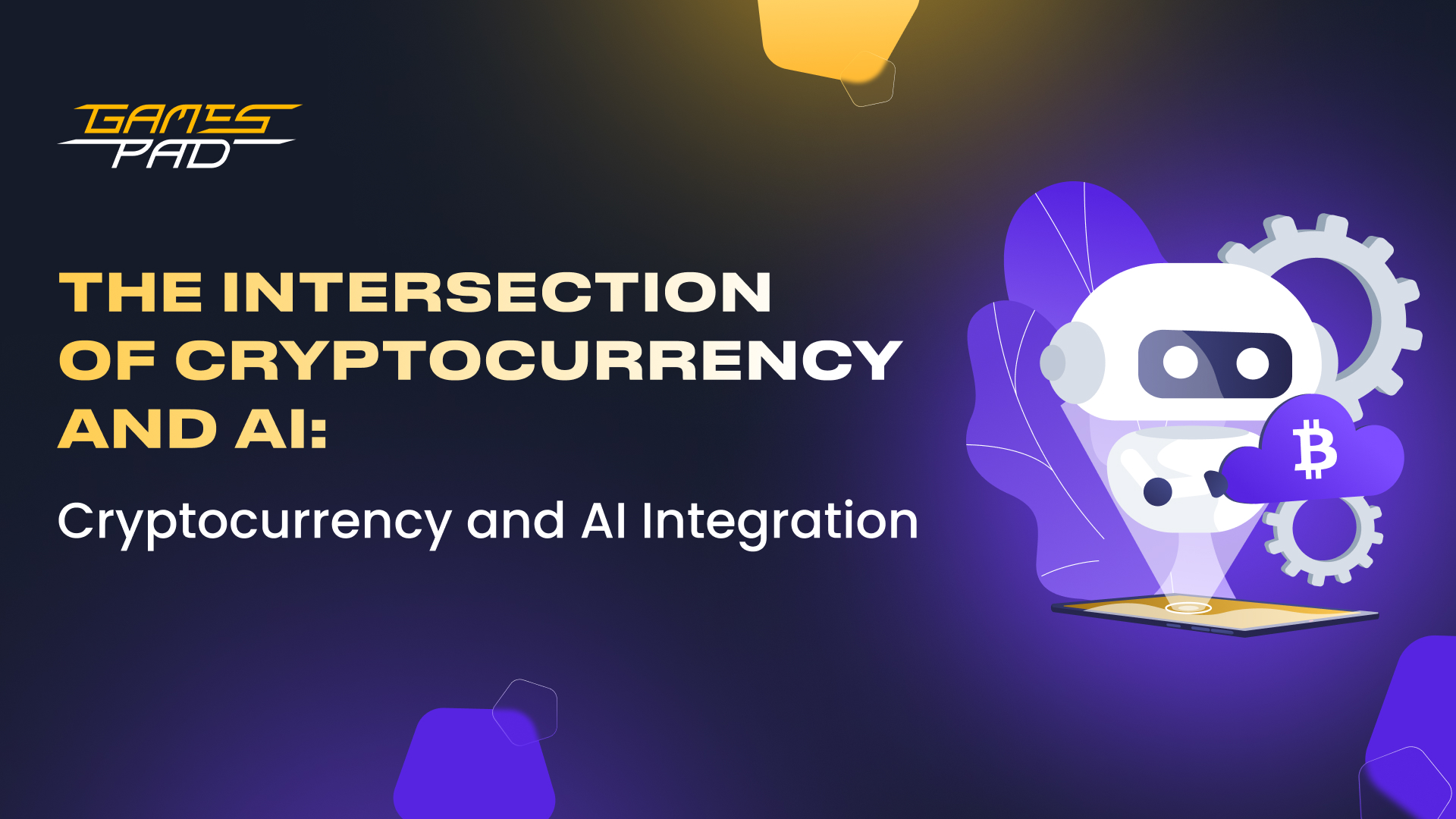
Cryptocurrency and artificial intelligence (AI) are two transformative technologies that have been reshaping various aspects of our society in recent years.
Cryptocurrency, notably popularized by Bitcoin, is a digital or virtual form of currency that uses cryptography for security and operates on a blockchain network independently of a central bank. Its decentralized nature and blockchain technologies have introduced new paradigms for transactions, finance, and even governance thus marking a new era in technological advancement.
Artificial intelligence, on the other hand, refers to the development of computer systems capable of performing tasks that typically require human intelligence. This includes but is not limited to speech recognition, natural language processing, problem-solving, and even decision-making.
The intersection of cryptocurrency and AI represents a convergence of two powerful forces in the technological landscape.
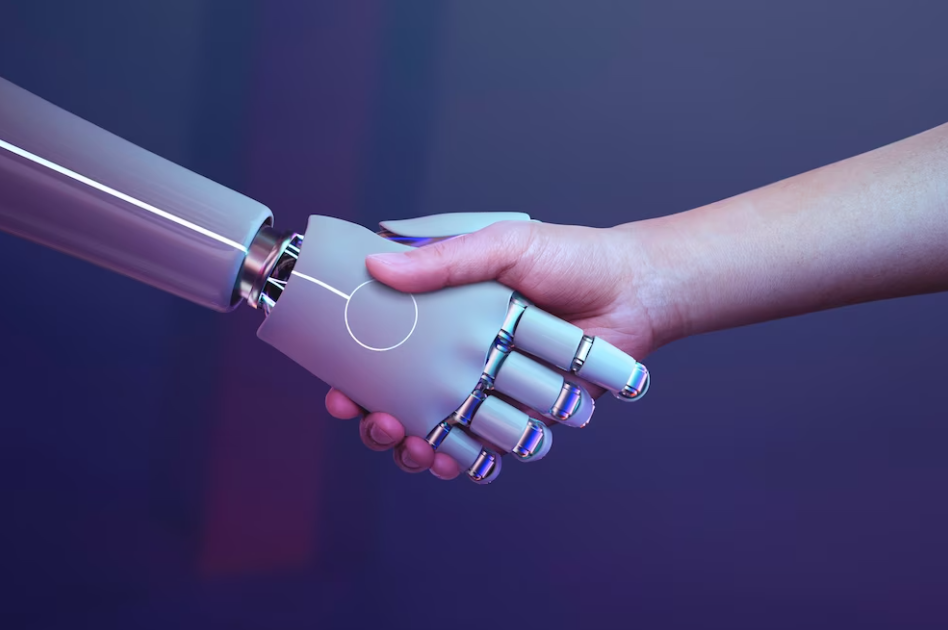
Source: Freepik
Cryptocurrencies like Bitcoin and Ethereum revolutionize the concept of money and financial transactions through a decentralized, secure, and transparent blockchain ecosystem.
Meanwhile, artificial intelligence, encompassing machine learning and deep learning, empowers machines to learn from data, make decisions, and perform tasks traditionally reserved for humans.
The integration of cryptocurrency and AI holds immense potential for innovation and disruption across various domains, paving the way for a more efficient, intelligent, and decentralized future.
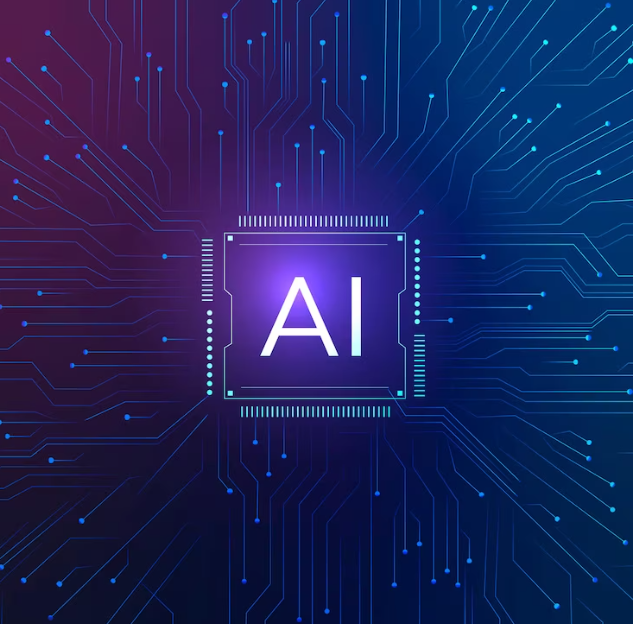
Source: Freepik
Artificial intelligence refers to the simulation of human intelligence in machines, enabling them to perform tasks that typically require human cognition. Key concepts within AI include the following.
Machine learning is a subset of AI that focuses on developing algorithms capable of learning from data and making predictions or decisions without explicit programming.
These algorithms analyze historical data, and learn patterns and relationships from big data sets, improving their performance over time through experience. Examples of machine learning applications include recommendation systems, image recognition, and natural language processing.
Deep learning is a specialized field of machine learning inspired by the structure and function of the human brain’s neural networks.
Deep learning algorithms, known as artificial neural networks, consist of multiple layers of interconnected nodes (neurons) that process and transform data inputs to generate output.
Deep learning has achieved remarkable success in tasks such as speech recognition, object detection, and language translation, fueled by advancements in computational power and the availability of big data sets.

Source: Freepik
The technological integration of AI models and cryptocurrency represents a groundbreaking synergy that has the potential to revolutionize various aspects of blockchain-based business networks, smart contracts, and crypto trading and investments. Let’s delve into some of these areas.
Artificial intelligence (AI) has limitless potential when it comes to enhancing blockchain solutions in several ways. Here are the most common ones.
AI solutions are employed to detect and prevent security breaches and fraudulent activities on the blockchain network. These algorithms analyze vast amounts of blockchain data to identify patterns indicative of suspicious behavior, thus bolstering security measures.
AI solutions help optimize blockchain technologies for improved efficiency and scalability. By analyzing network data and transaction patterns, AI applications can identify bottlenecks and optimize consensus mechanisms to enhance throughput and reduce latency.
AI-powered encryption techniques are utilized to enhance data security, privacy, and confidentiality on blockchain networks. These techniques leverage machine learning algorithms to generate and manage cryptographic keys, ensure secure data usage, transmission, and storage, and enhance data security.
AI models embedded in smart contracts allow seamless integration of contractual agreements in a decentralized and trustless manner.
AI applications can automate the execution of smart contracts by monitoring real-time data feeds and triggering predefined actions based on specified conditions. This automation streamlines business processes and reduces the need for manual intervention.
AI-driven optimization algorithms can dynamically adjust the parameters of smart contracts based on changing market conditions in the business world and user preferences. This flexibility enhances the adaptability and efficiency of smart contract applications in various domains.
AI-powered analytics tools analyze historical contract data to identify trends, risks, and opportunities. This analysis facilitates for stakeholders the decision-making process regarding contract negotiation, execution, and management.
AI is revolutionizing crypto trading and investments by providing advanced analytics, automation, and predictive capabilities.
AI-driven trading bots execute trades automatically based on predefined strategies and market signals. These bots leverage machine learning algorithms to analyze market data, identify profitable trading opportunities, and optimize trading strategies in real time.
AI solutions analyze historical market data, social media sentiment, and other relevant factors to predict future price movements of cryptocurrencies. These predictive analytics provide investors with more actionable insights and enable them to make data-driven decisions and mitigate risks in volatile markets thus increasing revenue streams.
AI systems assess the risk associated with cryptocurrency investments and optimize portfolio allocations to maximize returns while minimizing volatility. These systems provide personalized recommendations and more actionable insights based on individual risk tolerance and investment goals.
The technological integration of AI and blockchain is driving innovation across various domains, including blockchain-based business networks, smart contracts, and crypto trading and investments. As these technologies continue to evolve and mature, their symbiotic relationship holds the potential to reshape the future of finance and decentralized economies.
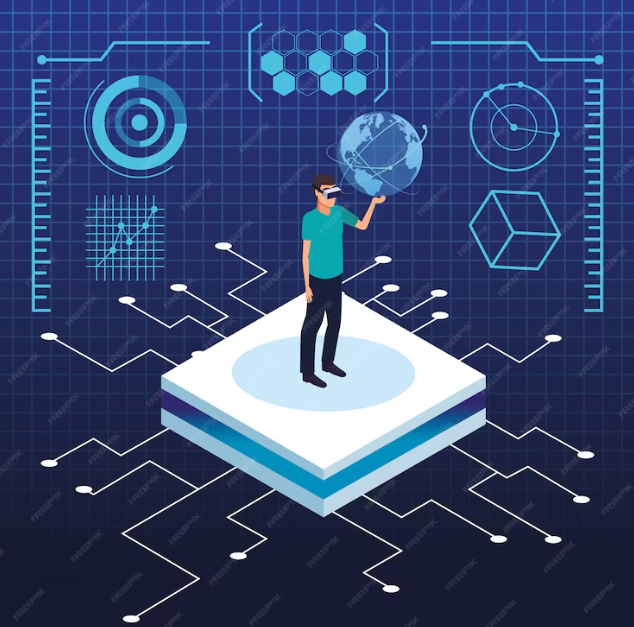
Source: Freepik
The integration of artificial intelligence (AI) into blockchain technology presents both ethical and practical implications that warrant careful consideration. Two critical areas to explore are security and privacy considerations, as well as regulatory challenges.
Artificial intelligence plays a crucial role in enhancing security measures within the blockchain ecosystem. AI-powered algorithms can detect and prevent security breaches, identify fraudulent activities, and safeguard crypto wallets and transactions. For example, anomaly detection algorithms can identify unusual patterns in transaction behavior, potentially indicating fraudulent activity.
Despite the benefits of AI-driven security measures, there are significant privacy concerns associated with the implementation of AI models embedded in blockchain technology.
AI models often require access to sensitive data to perform their functions effectively. In the context of cryptocurrencies, this raises concerns about the privacy of user information stored on the blockchain, data security, and data usage. There is a risk that AI algorithms could compromise user anonymity and expose personal data thus compromising data integrity if not properly implemented and regulated.
Achieving a balance between security and privacy is crucial in the implementation of AI projects in blockchain technology. Developers must prioritize privacy-preserving techniques during AI development while ensuring robust security protocols. Techniques such as differential privacy, homomorphic encryption, and zero-knowledge proofs can help mitigate privacy risks while still enabling effective artificial intelligence and machine learning security solutions.
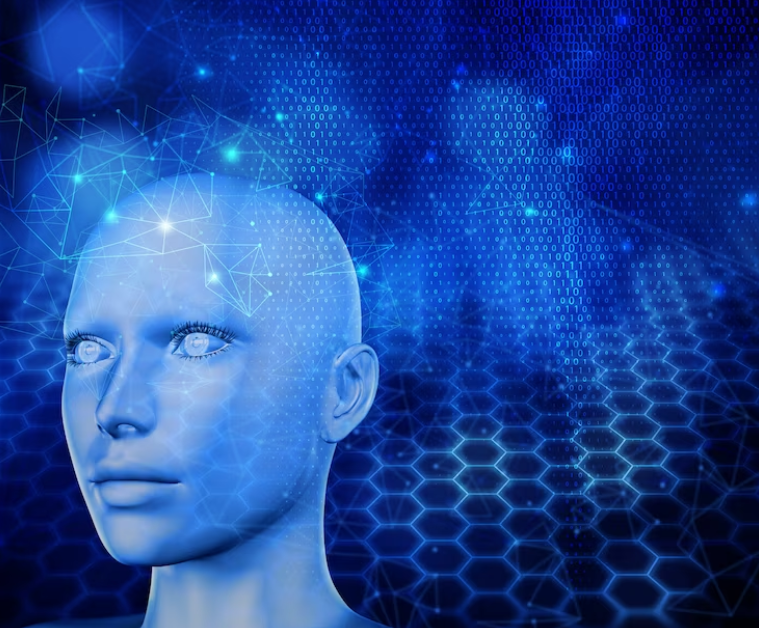
The integration of artificial intelligence into blockchain solutions has the potential to disrupt the regulatory landscape of cryptocurrencies. AI-powered analytics tools can provide regulators with enhanced capabilities for monitoring and enforcing compliance with regulatory requirements, such as anti-money laundering (AML) and know-your-customer (KYC) regulations.
AI and blockchain can streamline regulatory processes, improve regulatory oversight, and enhance transparency in the cryptocurrency ecosystem.
For example, AI algorithms can analyze blockchain transactions to detect suspicious activities and identify potential instances of fraud or market manipulation. This can help regulators better understand and mitigate risks associated with cryptocurrencies.
Despite the potential benefits, there are significant hurdles and challenges to overcome in the regulation of AI and blockchain.
These include concerns about algorithmic bias, data privacy and data integrity, jurisdictional issues, and the complexity of AI and blockchain regulating decentralized systems. Regulators must adapt and develop new frameworks to effectively address these challenges while fostering innovation and protecting consumer interests.
The implementation of different AI models in blockchain technology brings both opportunities and challenges in terms of security, privacy, and regulation. It is essential for stakeholders, including developers, regulators, and users, to collaborate and address these ethical and practical implications to ensure the responsible and sustainable integration of AI into the cryptocurrency ecosystem and blockchain processes.

Source: Freepik
The intersection of artificial AI and blockchain technology has sparked a wave of innovation, paving the way for groundbreaking applications across various industries. From finance and healthcare organizations to supply chain management and beyond, real-world use cases of AI in blockchain are demonstrating the transformative potential of these technologies.
In this text, we will explore and examine several compelling examples of AI applications in blockchain, showcasing how these innovative solutions are reshaping industries and driving forward the future of decentralized systems.
Fetch.ai is a decentralized artificial intelligence (AI) network that utilizes blockchain technology to enable autonomous machine-to-machine communication and transactions.
The platform aims to create a decentralized digital economy where autonomous AI agents can trade data, services, and assets. Fetch.ai’s AI-powered algorithms optimize resource allocation and enhance efficiency in various industries, including finance, supply chain, and transportation.
Numerai is a hedge fund that leverages AI and blockchain technology to crowdsource predictive models for stock market trading.
Participants submit their AI-driven trading algorithms to compete in weekly tournaments, with the best-performing models earning rewards in cryptocurrency. Numerai’s decentralized approach to hedge fund management enables anyone with AI expertise to contribute to the fund and potentially earn profits based on their predictive accuracy.
Cindicator is a fintech startup that combines AI and collective intelligence to provide analytics for financial markets.
The platform aggregates predictions from a diverse community of analysts and AI services to generate forecasts for various asset classes used in global trade operations, including cryptocurrencies. Cindicator’s hybrid approach has garnered significant attention and has been adopted by both individual investors and institutional clients.
Enigma is a blockchain-based protocol that enables secure and privacy-preserving computation of sensitive data.
The platform leverages AI and cryptographic techniques to enable decentralized data sharing and analysis while preserving data privacy thus optimizing business processes by ensuring data integrity and safety.
Enigma’s technology has been applied to various use cases, including decentralized finance (DeFi), supply chain management, and the healthcare industry, where sensitive data must be protected from unauthorized access and manipulation.

Source: Freepik
One of the primary challenges faced by AI blockchain startups is scalability. As the volume of encrypted data and transactions processed on blockchain networks continues to grow, scalability becomes a critical consideration.
AI algorithms require significant computational resources to process and analyze data efficiently, posing scalability challenges for blockchain networks with limited throughput and capacity.
Ensuring data integrity, privacy and security is another major challenge in the integration of AI and blockchain technology. AI algorithms often require access to sensitive encrypted data for AI training and optimizing models, raising concerns about data privacy and potential vulnerabilities.
Blockchain technology can provide cryptographic mechanisms for securing data, but ensuring robust privacy protections remains an ongoing challenge.
Regulatory compliance is a significant concern for AI blockchain solutions and startups operating in the cryptocurrency space.
Navigating the complex regulatory landscape and addressing compliance requirements, such as anti-money laundering (AML) and know-your-customer (KYC) regulations, can be challenging and resource-intensive. Startups must invest in legal and regulatory expertise to ensure compliance with applicable laws and regulations.
AI blockchain solutions and startups are pioneering innovative solutions at the intersection of AI and cryptocurrency, addressing real-world challenges and unlocking new opportunities for decentralized applications and services. While success stories abound, startups must navigate challenges related to scalability, data security, and regulatory compliance to realize the full potential of AI-driven blockchain technology.

Source: Freepik
Cryptocurrencies have the potential to revolutionize AI marketplaces by enabling decentralized platforms for data sharing and compensation.
These platforms could facilitate the exchange of AI models, datasets, and computational resources, allowing individuals and organizations to monetize their data and expertise. Smart contracts on blockchain networks could automate transactions and ensure fair compensation for contributors, fostering innovation and collaboration in the AI and blockchain ecosystem.
Decentralized AI marketplaces could democratize access to AI technologies and accelerate the development of new applications in areas such as healthcare, finance, and autonomous systems.
Experts foresee several trends and breakthroughs in the future of AI and blockchain solutions.
The integration of AI and blockchain technology is expected to deepen, leading to new synergies and applications. AI algorithms could optimize blockchain protocols for scalability, privacy, and security, while blockchain technology could provide the infrastructure for decentralized AI marketplaces and autonomous systems.
AI-powered predictive analytics are expected to become more sophisticated, enabling more accurate forecasting of cryptocurrency prices and market trends. This data could empower investors and traders to make informed decisions and mitigate risks in volatile markets.
Decentralized finance (DeFi) is expected to continue its rapid growth, fueled by innovations in AI and blockchain technology.
AI algorithms could optimize lending and trading protocols, automate risk management, and enhance the efficiency of DeFi platforms. These advancements could democratize access to financial services and disrupt traditional banking and finance by eliminating centralized control.
Regulatory frameworks governing AI and blockchain are expected to evolve in response to technological advancements in the artificial intelligence sector and emerging risks.
Regulators may seek to strike a balance between fostering innovation and protecting consumers and investors, leading to new regulations and compliance requirements. Clear regulatory guidelines could provide certainty and stability for AI and blockchain projects, enabling broader adoption and investment.
The future of generative AI and cryptocurrency holds immense potential for innovation and disruption across various domains. Decentralized AI marketplaces could democratize access to AI services and technologies and incentivize collaboration, while advancements in analytics and decentralized finance could reshape financial markets and investment strategies.
As AI and blockchain technology continue to evolve, we can expect to see new breakthroughs and opportunities that redefine the intersection of AI and cryptocurrency in the future.
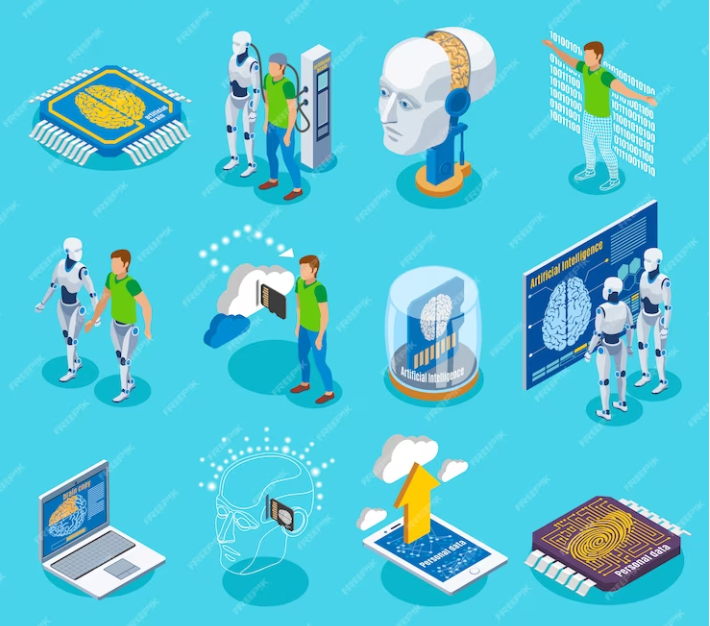
Source: Freepik
Ethical considerations are paramount in the development and application of artificial intelligence (AI) within the cryptocurrency space. While each AI solution presents immense opportunities for innovation, it also poses ethical challenges that must be addressed to ensure responsible and equitable use.
Developers and stakeholders in the cryptocurrency industry must prioritize ethical principles such as transparency, fairness, accountability, and privacy in the design and implementation of AI-driven systems.
AI algorithms used in cryptocurrency should be transparent and explainable, enabling users to understand how complete transactions are made and assess potential biases or risks. Transparency promotes trust and accountability and helps to gain confidence in the market, fostering responsible AI use in financial transactions and decision-making.
AI systems should be designed to ensure fairness and mitigate biases, particularly in cryptocurrency trading and investment algorithms. Developers must address biases in AI training data and algorithms to prevent discriminatory outcomes and promote equal opportunities for all participants in the global trade ecosystem.
Stakeholders involved in AI-driven cryptocurrency systems must be held accountable for their actions and decisions. Clear mechanisms for accountability, including auditing, oversight, decision-making process, and recourse for individuals affected by AI-driven systems, are essential to prevent abuse, resolve disputes effectively, and ensure ethical behavior.
Protecting user private data is paramount in the development and deployment of AI-driven cryptocurrency solutions. Developers must implement robust privacy safeguards and data protection measures to prevent unauthorized access, misuse, or exploitation of sensitive user data.
Addressing environmental concerns related to cryptocurrency mining is crucial for creating sustainable practices in the industry. Cryptocurrency mining, particularly in proof-of-work (PoW) systems like Bitcoin, consumes significant amounts of energy and contributes to carbon emissions. AI can play a role in mitigating these environmental impacts by optimizing energy usage and promoting sustainable mining practices.
AI algorithms can optimize cryptocurrency mining operations to reduce energy consumption and increase efficiency. Techniques such as machine learning and AI optimization algorithms can optimize mining hardware configurations, schedule tasks during off-peak hours, and identify energy-saving opportunities.
AI-powered solutions can facilitate the integration of renewable energy sources, such as solar and wind power, into cryptocurrency mining operations. AI algorithms can forecast energy production, optimize resource allocation, and balance energy supply and demand to maximize the use of renewable energy and minimize reliance on fossil fuels.
AI-driven systems can track and monitor the carbon footprint of cryptocurrency mining operations, providing insights into energy usage and emissions. This data can inform sustainability initiatives, incentivize eco-friendly mining practices, and promote transparency and accountability in the cryptocurrency industry.
Blockchain technology can be used to create transparent and traceable carbon offset markets, where cryptocurrency miners can purchase carbon credits to offset their emissions. AI algorithms can optimize carbon offset transactions, match buyers and sellers, and ensure the integrity and transparency of carbon offset projects.
In conclusion, ethical considerations and sustainability are critical aspects of AI use in the cryptocurrency industry. By balancing innovation with ethics and leveraging AI-driven solutions to address environmental concerns, stakeholders can create a more responsible and sustainable cryptocurrency ecosystem that benefits both users and the planet.
The intersection of cryptocurrency and artificial intelligence (AI) represents a convergence of two transformative technologies that have the potential to reshape various aspects of our society.
As cryptocurrencies continue to disrupt traditional financial systems with their decentralized nature and blockchain technology, AI offers unparalleled capabilities in data analysis, prediction, and automation. However, as we navigate this exciting frontier, it is crucial to prioritize ethical considerations and sustainability to ensure the responsible and equitable use of these technologies.
Transparency, fairness, accountability, and privacy must be prioritized to build trust and confidence in AI-powered systems. Developers and stakeholders must work together to address biases, ensure transparency in decision-making processes, and protect user privacy and data integrity.
Moreover, sustainability is essential to address environmental concerns related to cryptocurrency mining, particularly in proof-of-work systems. AI-driven optimization algorithms can help reduce energy consumption, integrate renewable energy sources, and track and offset carbon emissions associated with cryptocurrency mining operations. By promoting sustainable practices, we can mitigate the environmental impact of cryptocurrency mining and build a more environmentally friendly cryptocurrency ecosystem.
Looking ahead, the future of AI and cryptocurrency holds immense promise for innovation and disruption across various domains. Decentralized AI marketplaces, advancements in predictive analytics, and the expansion of decentralized finance are just a few examples of the exciting opportunities on the horizon.
As AI and blockchain technology continue to evolve, it is essential to remain mindful of the ethical and sustainability implications and work towards building a future where technology serves the greater good of society.